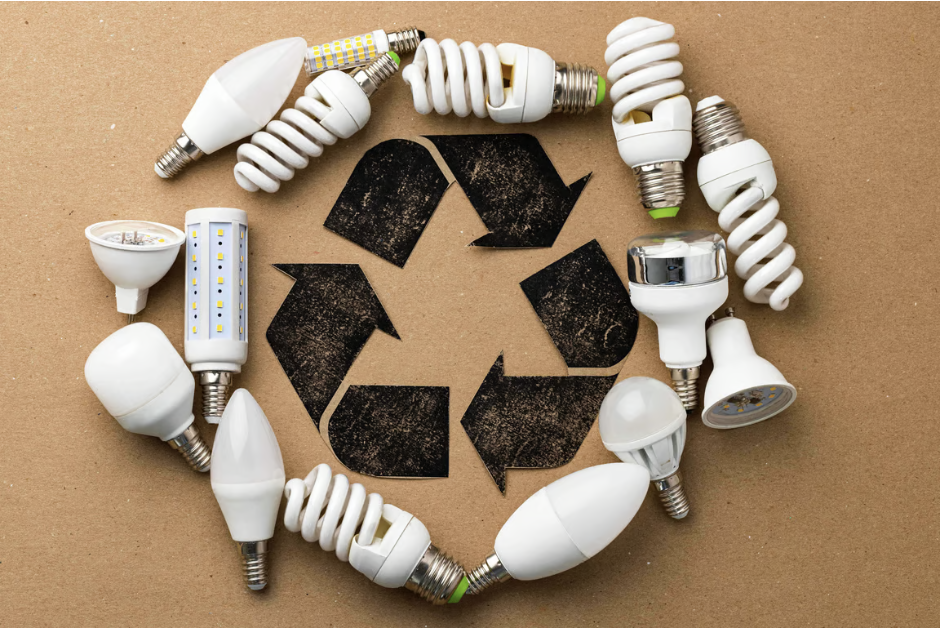
Free shipping for US orders over $150
Lowest Price Guaranteed Shop Now

With the rise of energy-efficient lighting, LED light bulbs have become increasingly popular in homes and businesses. However, like all light bulbs, LEDs eventually stop working and need to be disposed of properly. The good news is that LED bulbs are more environmentally friendly than older types, such as incandescent bulbs or compact fluorescent (CFL) bulbs, and they can often be recycled. In this article, we will cover how to recycle LED light bulbs and why it’s important.
LED bulbs contain valuable materials that can be reused, including metals, glass, and plastic. However, some components, such as small electronic parts, may require careful handling. Unlike hazardous waste materials like fluorescent tubes and CFL bulbs, which contain mercury, LEDs are generally safer. Even so, it’s better to recycle rather than throw away LED bulbs to reduce environmental impact and recover these materials.
The first step to recycling LED light bulbs is to check if your city or town has a recycling program that accepts them. Many municipalities have specific recycling centers for electronics and bulbs. These centers are equipped to handle the safe disposal and recycling of LED light bulbs.
Some large retailers, such as home improvement stores, offer recycling programs for LED light bulbs. Stores like Home Depot and Lowe’s often have drop-off boxes where you can dispose of LED bulbs, incandescent bulbs, and even fluorescent tubes. This is a convenient option if you’re looking for an easy way to recycle.
If local options are unavailable, you can search for a bulb recycling program. These programs allow you to mail in your used LED light bulbs for proper recycling. Companies like TerraCycle provide such services, and they ensure that all parts of the bulb are repurposed. Find programs like:
It’s tempting to simply throw away LED light bulbs when they stop working. However, doing so means missing out on the opportunity to recycle valuable materials. Furthermore, LED bulbs may contain trace amounts of metals and other components that are best handled through proper recycling channels. Disposing of LEDs in your regular trash should be avoided whenever possible.
Understanding how to recycle other types of light bulbs can help ensure you’re disposing of all bulbs properly.
Recycling LED light bulbs not only conserves resources but also helps reduce waste in landfills. By recovering materials such as metals and glass, recycling programs contribute to a more sustainable future. Proper disposal also ensures that potentially harmful components are handled safely.
LED light bulbs are designed to last much longer than their counterparts. Where incandescent bulbs may last only 1,000 hours and CFL bulbs up to 10,000 hours, LED bulbs often last between 25,000 and 50,000 hours. This longer lifespan means you will dispose of and recycle fewer bulbs over time, reducing your overall environmental impact.
However, LEDs still eventually reach the end of their lifespan. When that time comes, it’s important to recycle them, as the materials can be repurposed for other products. The recycling process generally involves breaking down the bulb to separate metals, glass, and other materials that can be reclaimed for future use.
Q. Can you throw away LED bulbs in the trash?
A. While LED bulbs don’t contain hazardous materials like mercury, it’s still better to recycle them to recover valuable components like metals and glass. Throwing them away in the trash should be avoided to reduce environmental waste.
Q. Are LED bulbs considered hazardous waste?
A. No, LED bulbs are not classified as hazardous waste. However, it’s still recommended to recycle them instead of throwing them in regular trash to ensure that their components are handled properly.
Q. Can I recycle LED bulbs with regular glass?
A. No, LED bulbs should not be recycled with regular glass because they contain other components, such as metals and electronics, that require special processing.
Q. What happens if I break an LED bulb?
A. LED bulbs do not contain hazardous materials like mercury, so breaking one isn’t as risky as breaking a CFL bulb. However, you should still handle broken glass with care and dispose of the pieces according to local guidelines.
While LED light bulbs are not considered hazardous waste like CFL bulbs, it’s still important to recycle them properly. Checking local recycling programs, using retailer drop-off points, or participating in a bulb recycling program are all excellent ways to ensure that your used LED light bulbs are disposed of responsibly. Avoid throwing away LED light bulbs in the trash, and take a small step toward reducing environmental waste while contributing to resource recovery.
Recycling LED bulbs is easy and impactful—make it part of your sustainable living routine!